| Srl | Item |
| 1 |
ID:
181216
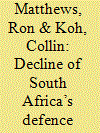

|
|
|
|
|
| Summary/Abstract |
The growth of South Africa’s apartheid era defence industry was propelled by international isolation following the 1984 UN arms embargo and revealed military technology deficiencies during the border war. Weapons innovation became an imperative, fostering development of frontier technologies and upgrades of legacy platforms that drove expansion in arms exports. However, this golden era was not to last. The 1994 election of the country’s first democratic government switched resources from military to human security. The resultant defence-industrial stagnation continues to this day, exacerbated by corruption, unethical sales, and government mismanagement. The industry’s survival into the 2020s cannot be assured.
|
|
|
|
|
|
|
|
|
|
|
|
|
|
|
|
| 2 |
ID:
144730
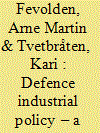

|
|
|
|
|
| Summary/Abstract |
This article explores whether it makes sense for national governments to employ defence industrial policies – such as offsets and discriminatory procurement practices – to support their domestic defence industries. This question has so far primarily been discussed by economists, who have argued strongly against the use of defence industrial policies. This article maintains that these economists fail to address the often complex motivation behind the introduction of these policies. It illustrates these shortcomings by contrasting their arguments against a case study of Norway, which accounts for the country’s use of defence industrial polices from the early post-Second World War era up until today. The article concludes that, depending on their objectives, defence industrial policies can be seen as either a sound security strategy or an economic fallacy.
|
|
|
|
|
|
|
|
|
|
|
|
|
|
|
|
| 3 |
ID:
167176
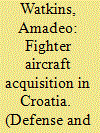

|
|
|
|
|
| Summary/Abstract |
The possibility for Croatia to obtain new fighter aircraft is not new, as this option has been publicly debated for at least a decade. A sudden decision to advance the acquisition of a limited number of fighter aircraft was made in 2017 with an international tendering process concluding in early 2018. Through open source material, this paper will look at this procurement process by examining the relationship between policy and strategic thinking on the one side, and policy delivery on the other, and evaluate why the tendering process failed in achieving envisaged results. The paper concludes that the problems facing the Croatian aircraft acquisition process stem from at least two interrelated factors: firstly, at the operational level, the failure of the procurement was the direct result of mismanaged tendering procedures linked to the wider public administration reform process; and secondly, at the strategic level, inherently complex civil-military relations and related cultural aspects which have not been adequately addressed over the past decades. The result was a failure to deliver on government policy, something which this paper argues will need to be addressed over the medium to long term.
|
|
|
|
|
|
|
|
|
|
|
|
|
|
|
|
| 4 |
ID:
164521


|
|
|
|
|
| Summary/Abstract |
A dynamic multi-stage decision-theoretic approach is introduced to establish the optimal offset and its incidence, the contract price arising from bargaining, and the scale of the acquisition. A new rationale is suggested for offsets in terms of their role as an insurance devise. Results are derived for the pricing of delivery contracts subject to offset claims and their national security implications. It is shown that the national security is strictly convex in the offset transaction. As to the incidence of the offset, the offset claim is shown to be capitalised in the delivery price. The bargaining price is shown to depend on the value of the product to be delivered for the national security, the relative negotiation power of the contracting partners and the social cost of public funds. The analysis highlights the expectation effects of offsets on the bargaining price and the scale of delivery. The results aid in explaining why offsets are widely used in procurement contracts for defence materiel. As they contribute to the national security, they should be allowed to survive and not be denied under competition laws.
|
|
|
|
|
|
|
|
|
|
|
|
|
|
|
|
| 5 |
ID:
156747
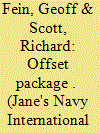

|
|
|
| 6 |
ID:
167177
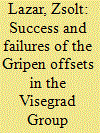

|
|
|
|
|
| Summary/Abstract |
The Soviet-led Council for Mutual Economic Assistance member, Central European countries found themselves in a difficult political and economic situation after the collapse of the Soviet Union. Three post-Eastern Bloc countries formed the Visegrad Group to strengthen their ties to the West, but the need for foreign investment, job creation and technology transfer was urgent.
|
|
|
|
|
|
|
|
|
|
|
|
|
|
|
|